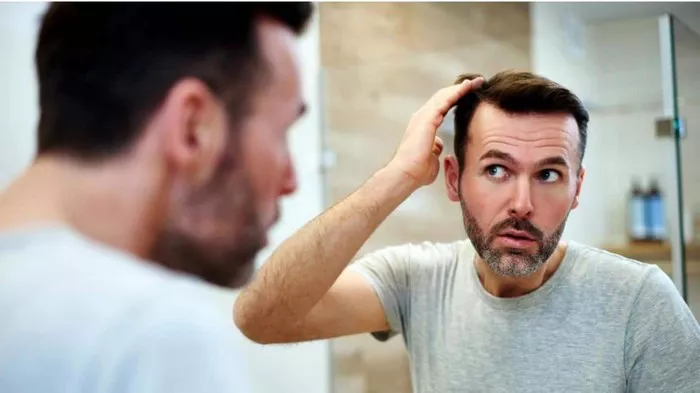In the pursuit of luscious locks, men often seek methods to accelerate hair growth. Whether aiming to remedy a receding hairline or simply desiring thicker, fuller hair, understanding the intricacies of hair growth is paramount. From lifestyle adjustments to specialized treatments, a multifaceted approach can foster optimal conditions for robust hair growth. This comprehensive guide delves into the science behind hair growth, dispels common myths, and provides practical tips and products to help men achieve their hair growth goals.
Overview of Hair Growth
Hair growth is a dynamic process governed by a cycle consisting of three main stages: anagen, catagen, and telogen.
1. Anagen Phase: This is the active growth phase, during which hair follicles produce new hair cells. The duration of the anagen phase varies among individuals, influencing hair length and thickness.
2. Catagen Phase: Following the anagen phase, hair enters a transitional stage marked by decreased growth activity. The hair follicle regresses, leading to detachment from the blood supply.
3. Telogen Phase: Commonly referred to as the resting phase, hair remains dormant before shedding and regenerating. Around 10-15% of hair follicles are typically in the telogen phase at any given time.
Several factors influence the duration and quality of each phase, including genetics, age, hormonal fluctuations, and overall health. While genetics largely determine hair growth patterns, lifestyle and environmental factors also play a significant role.
Healthy Lifestyle Tips
Maintaining a healthy lifestyle is essential for promoting optimal hair growth.
1. Balanced Diet: A diet rich in vitamins, minerals, and protein is crucial for nourishing hair follicles. Incorporating foods such as leafy greens, eggs, fatty fish, and nuts can support hair health.
2. Regular Exercise: Physical activity improves circulation, ensuring essential nutrients reach the hair follicles. Aim for a balanced exercise routine to enhance overall well-being and promote healthy hair growth.
3. Stress Management: Chronic stress can disrupt hormonal balance and contribute to hair loss. Practice stress-reducing techniques such as meditation, yoga, or deep breathing exercises to support hair health.
Hair Care Practices
Gentle hair care practices can minimize damage and promote optimal conditions for hair growth.
1. Avoid Harsh Chemicals: Limit the use of harsh shampoos and styling products containing sulfates, parabens, and alcohol, as these can strip the hair of its natural oils and cause damage.
2. Gentle Handling: Be mindful of how you handle your hair, avoiding excessive pulling or brushing, particularly when wet. Use a wide-tooth comb to detangle hair gently.
3. Avoid Over-Styling: Excessive heat styling, tight hairstyles, and chemical treatments can weaken the hair shaft and lead to breakage. Allow hair to air dry whenever possible and minimize the use of heat styling tools.
Recommended Products
Several products and ingredients have been touted for their potential to promote hair growth.
1. Minoxidil: Available over-the-counter, minoxidil is a topical solution approved by the FDA for treating male pattern baldness. It works by increasing blood flow to the scalp, stimulating hair follicles to enter the anagen phase.
2. Finasteride: This prescription medication inhibits the conversion of testosterone into dihydrotestosterone (DHT), a hormone linked to hair loss. Finasteride is effective in slowing down hair loss and promoting hair regrowth in men with male pattern baldness.
3. Natural Oils and Serums: Natural oils such as coconut oil, castor oil, and argan oil are rich in vitamins and fatty acids that nourish the scalp and hair follicles. Serums containing ingredients like biotin, caffeine, and keratin can also support hair growth and strengthen hair strands.
Professional Treatments
For those seeking more intensive interventions, several professional treatments are available.
Platelet-Rich Plasma (PRP) Therapy: This procedure involves injecting a concentrated form of the patient’s own platelets into the scalp to stimulate hair follicles and promote hair growth. PRP therapy has shown promising results in clinical studies and is often used in conjunction with other treatments for optimal outcomes.
Myths vs. Facts
Dispelling common myths about hair growth is essential for informed decision-making.
Myth: Cutting Hair Makes It Grow Faster: Contrary to popular belief, cutting hair does not affect its rate of growth. While regular trims can prevent split ends and breakage, they do not accelerate hair growth.
Fact: Genetics Play a Significant Role: While lifestyle factors can influence hair health, genetics ultimately determine hair growth patterns and susceptibility to hair loss. Understanding your genetic predisposition can inform personalized treatment approaches.
Consultation Advice
Individuals experiencing hair loss or seeking to enhance hair growth should consult with a dermatologist or trichologist for personalized advice and treatment recommendations. These professionals can assess the underlying causes of hair loss and tailor a treatment plan to address specific needs and goals.
In conclusion, achieving faster hair growth requires a holistic approach encompassing lifestyle modifications, appropriate hair care practices, and, if necessary, professional interventions. By understanding the intricacies of hair growth and implementing evidence-based strategies, men can cultivate healthier, more resilient hair that enhances their confidence and well-being.


